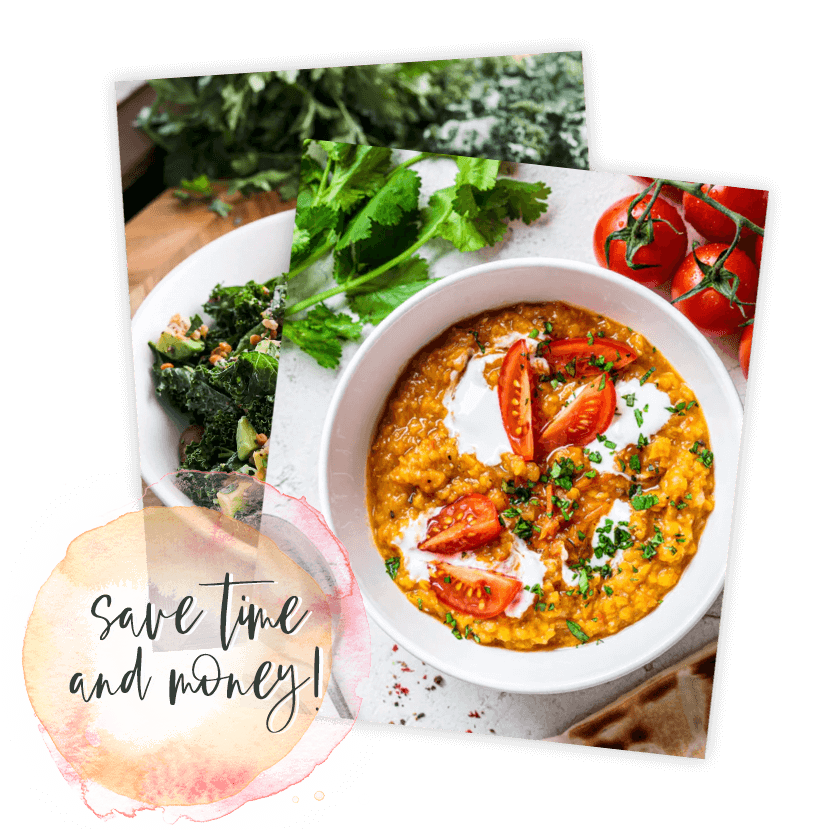This sweet and luscious carrot halwa is made with zero added sugar and uses vegan ingredients to create an easy and healthy Indian dessert recipe. Grated carrots slowly simmered in a blissful mix of cashews, almonds, raisins, cardamom and coconut, resulting in a fragrant dessert you can enjoy more often. Watch the video to learn how to make Gajjar Halwa – trust us; it’s 24 ‘carrot’ gold!

Friends, you don’t need a reason to enjoy this stunner gajjar halwa, aka carrot halwa. The inspiration for this recipe comes from my love of different types of Desi mithai (South Asian sweets). Honestly, devouring mithai instantly transports me to my childhood, making traditional carrot halwa and barfi with mummy.
Look, mum, I finally got it up on the site! 🙂

I’m not going to lie to you. I’m usually the one eyeing up all the mithai at celebrations and never sit tight until I’ve “sampled” every single one (how can one resist?!). In all honesty, though, it can feel pretty heavy. In my particular case, I do have to be extra mindful since, a few years ago, I developed an intolerance to dairy, which motivates me to create more dairy-free recipes—this, coupled with our commitment to a planet-loving diet. You can find all my easy and healthy vegan creations in the recipe catalogue.
The single most important thing that distinguishes meh carrot halwa from I’m-going-to-faint-amazing gajjar halwa? The slow simmering of carrots with milk, which helps bind the mixture. Typically, most recipes rely on dairy (regular milk and condensed milk) to make this happen. My trick is to simmer in oat milk and throw in coconut flour when the dish is almost done. You also get so much of that coco-nutty flavour.
What Goes In Gajjar Halwa?

Here’s what I add to my vegan carrot halwa. While these are the most traditional carrot halwa additions, any suitable nuts and dried fruits will work like a charm – think pistachios, pecans, cranberries, figs etc. I really wouldn’t hesitate to toss in a handful of hemp or chia seeds either if you’re looking to boost your intake of protein, healthy fats, fibre and more.
- Carrots – Traditionally, carrot halwa is also made with red carrots. However, I used local orange carrots, and you can see how beautiful and vibrant it turned out. The carrots are peeled and grated using a food processor. You can absolutely grate by hand.
- Nuts – I used a combination of plain cashews and almonds, but feel free to throw in your favourites.
- Raisins – To bring that natural sweetness and lovely softness to the gajjar halwa. I also have a soft spot for sultanas – which work really well.
- Erythritol – This is a low-calorie sweetener. With only 0.24 calories per gram, it provides 70% of the sweetness of sugar.
- Oat milk – I adore oat milk and use it precisely because its consistency and creaminess are lovely. My favourite oat milk is from the Canadian brand Earth’s Own. It’s got a nice amount of protein with no added sugar.
- Coconut – I typically rely on coconut flour and occasionally use unsweetened desiccated coconut when running low on ingredients.
- Cardamom – For that floral flavour, I always (I mean always!) use fresh pods. There’s nothing like it!

This recipe makes a relatively small portion – you can certainly double or even treble the recipe and freeze the carrot halwa to enjoy another day. And if you feel it’s not sweet enough, you can adjust to your taste buds – it’s a pretty versatile recipe formula. I used a zero-calorie sweetener, erythritol, so that family and friends who are watching their blood sugars (with diabetes), can also partake. My feeling is that no one should feel like they’re missing out.
With that intentional mindset, let me show you how to make vegan carrot halwa at home.
How To Make Vegan Carrot Halwa – Without Khoya (Milk Curds)

- Fry the carrots – Heat the coconut in a large pan, add the grated carrots and fry for 5 minutes on medium heat (Images 1-2).
- Build the halwa mixture with add-ins – The carrots will be somewhat softer at this point. Follow with the nuts, raisins, cardamom, oat milk and sweetener (Images 3-4). Give it a good stir and bring it to a boil. You’ll need to reduce the heat to low, cover and cook for at least 45 minutes (Images 5-7). Don’t forget to stir a few times during this time to make sure the mixture does not stick to the bottom of the pan. If it does, add a dash of more milk.
- Coconut love – Throw in the coconut flour, stir and continue cooking the carrot halva for 15-20 minutes. Once done, give it a good stir (Images 8-9).
- Garnish – Finish with slivered almonds – if you fancy even more crunch 🙂 (Image 10).
Nutrition Highlights:
One serving* of this Carrot Halwa recipe is:
- An excellent source of fibre
- An excellent source of vitamin A
- A very high source of potassium
- An excellent source of calcium
- A good source of iron
- Net carbs: 34 g
- Zero added sugar
*Percent Daily Values are based on a 2000 calorie diet.

Frequently Asked Questions
Is Carrot Halwa Good For Health?
This halwa recipe is plant-powered and made with nutritious ingredients like carrots, nuts and dried fruits. It contains zero added sugar – yet doesn’t compromise on flavour. It uses a dash of coconut oil and is 100% vegan, catering to various dietary needs. It’s a wonderful pick for Ramadan and all your celebrations. You can find gajjar halwa’s nutrition profile above and its specific breakdown in the recipe card below.
Can You Freeze Carrots?
If you’re like me and purchase a big bag of carrots, you need to have a plan for storing them – to help reduce food waste. According to the National Center for Home Food Preservation, you can blanch whole carrots for 5 minutes, sliced carrots for a couple of minutes, and then cool, drain and store them in your freezer. It really is that easy!
Looking for more easy and healthy vegan desserts? Make sure to check out:
- Vegan Blueberry Cheesecake
- Super Moist Vegan Chocolate Cake
- Vegan Rose Falooda
- Masala Chai Vegan Waffles
- Coconut Watermelon Ice Cream
Have you tried carrot halwa (gajjar halwa) before? What’s your favourite dessert recipe?
If you try this carrot halwa recipe, I would love to hear from you! Leave a comment, rate it, or share a photo and hashtag with #desiliciousrd on Instagram, Facebook and Twitter! Can’t wait to see your photos.
Want a FREE Delicious Offer?
Video
Ingredients
- 1.5 tbsp coconut oil, cold-pressed
- 3 carrots, extra large, washed, peeled and grated, Benefits of cooked carrots
- ¼ cup cashews, plain, unsalted
- ¼ cup sliced almonds, plain, unsalted
- 15 green cardamoms, from pods, crushed
- ¼ cup raisins , plain
- 2⅔ cup oat milk, unsweetened
- 4 tsp erythritol
- 2 tbsp coconut flour, plain
Instructions
- Heat the coconut oil in a large pan, and add the grated carrots and fry for 5 minutes on medium heat.
- The carrots will be somewhat softer at this point. Follow with the nuts, raisins, cardamom, oat milk and erythritol. Give it a good stir and bring it to a boil.
- Reduce the heat to low, cover and cook for at least 45 minutes. Don't forget to stir several times during this time to make sure the mixture does not stick to the bottom of the pan.
- Stir in the coconut flour, and continue cooking the carrot halva for 15-20 minutes. Once done, give it a good stir, and finish with slivered almonds – if you fancy even more crunch.
Notes
- Use fresh cardamom instead of ready-made cardamom powder.
- Simmer until the mixture comes together.
- Feel free to reduce the amount of coconut oil and sweetness to suit your needs.
- Store in an airtight container in the fridge for up to 4 days or freeze for up to a month. Defrost in the fridge and heat before serving.
Nutrition Information:
Keep in mind that the nutritional values provided are approximations and suggestions, and might fluctuate depending on ingredient variations, portion sizes, and recipe adjustments. This nutrition facts table cannot account for your individual needs. Your body — including your hunger and satiety cues — change daily. It’s perfectly fine to eat more or less on different days. Instead of letting food guilt take over, consider mindful eating.
* Percent Daily Values are based on a 2000 calorie diet.












